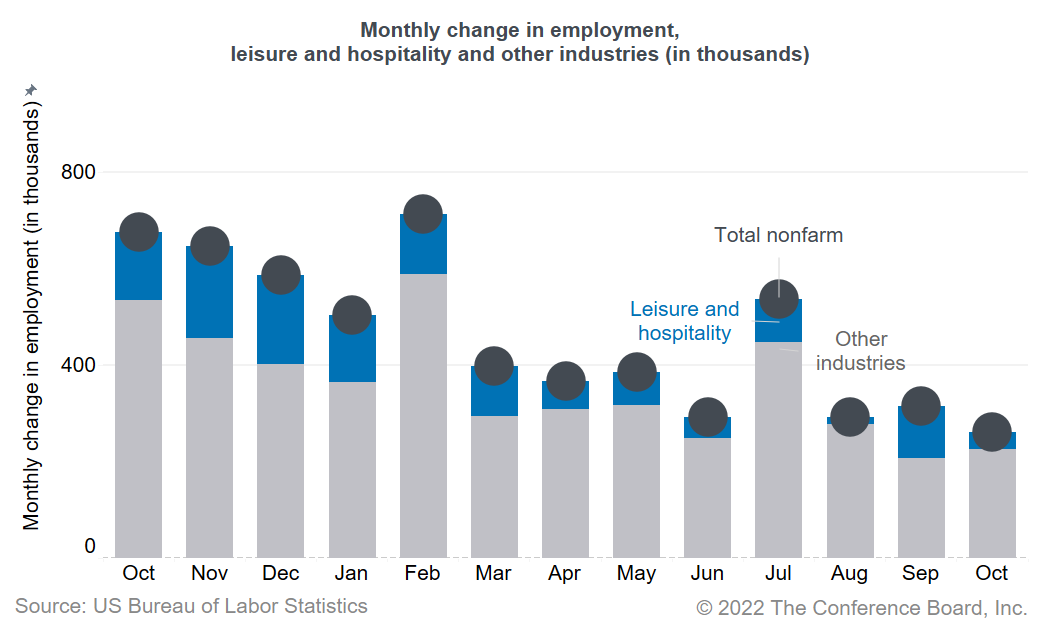Robust Job Growth Continues
04 Nov. 2022 | Comments (0)
Commentary on today’s U.S. Bureau of Labor Statistics Employment Situation Report
Today’s jobs report revealed continued strength in the US labor market: 261,000 jobs were added in October 2022, after an increase of 315,000 jobs (an upward revision) in September. Labor demand remains strong while labor supply is constrained, keeping the labor market tight. Some cooling of labor shortages has been observed over the past few months, but October’s report emphasizes that we are not yet near significant easing of recruitment and retention difficulties. Wage growth remains elevated and this will make the Fed’s task of bringing inflation under control harder. This solid jobs report supports the Fed’s intent to continue raising rates, even if at a slower pace.
The unemployment rate ticked up to 3.7 percent in October 2022, from 3.5 percent in September. The labor force participation rate ticked down to 62.2 percent, from 62.3 percent in September. Average hourly earnings is down slightly from earlier this year but remains quite elevated (4.7 percent growth over the past year).
Most industries reported an increase in employment. Leisure and hospitality gained 35,000 jobs (after adding 107,000 jobs last month), with other notable gains reported in health care and social assistance (71,100), professional and business services (39,000), manufacturing (32,000), and wholesale trade (14,600).
While job gains remained strong in October, there are signs that the labor market is gradually cooling and labor shortages are easing somewhat. First, job growth is down from its pace in the first half of 2022 (444,000 average monthly job gains). Second, according to The Conference Board Measure of CEO Confidence™, fewer CEOs expect some or a lot of trouble overall attracting qualified workers over the next 12 months (39 percent of CEOs in Q4, down from 66 percent in Q1 2022). Third, according to The Conference Board Consumer Confidence Survey®, fewer consumers say jobs are plentiful (45.2 percent in October, down from 56.7 percent in March 2022). Lastly, the job openings rate in the private sector has dropped to 6.9 percent, from 7.7 percent in March 2022, while the quits rate is now at 2.9 percent, down from 3.3 in March 2022.
At the same time, there are no signs that widespread layoffs are happening. So far, temporary help services—a leading indicator for hiring—continues to add jobs (11,800). In addition, different layoff measures remain historically low without evidence of a significant increase.
It is increasingly likely that the US will fall into recession around yearend 2022 amid the Fed’s rapid tightening of monetary policy. With the US economy slowing, the labor market is also expected to further cool over the coming months and possibly shed some jobs during 2023. This may result in the unemployment rate rising to about 4.5 percent in 2023. There may be some temporary easing of labor shortages in 2023 as demand for workers diminishes. However, recruitment and retention difficulties will not disappear, with the unemployment rate projected to remain relatively low in the context of past downturns. Once the US economy starts growing again, severe labor shortages could soon reappear.

-
About the Author:Frank Steemers
The following is a bio or a former employee/consultant Frank Steemers is a Senior Economist at The Conference Board where he analyzes labor markets in the US and other mature economies. Based in New …




0 Comment Comment Policy